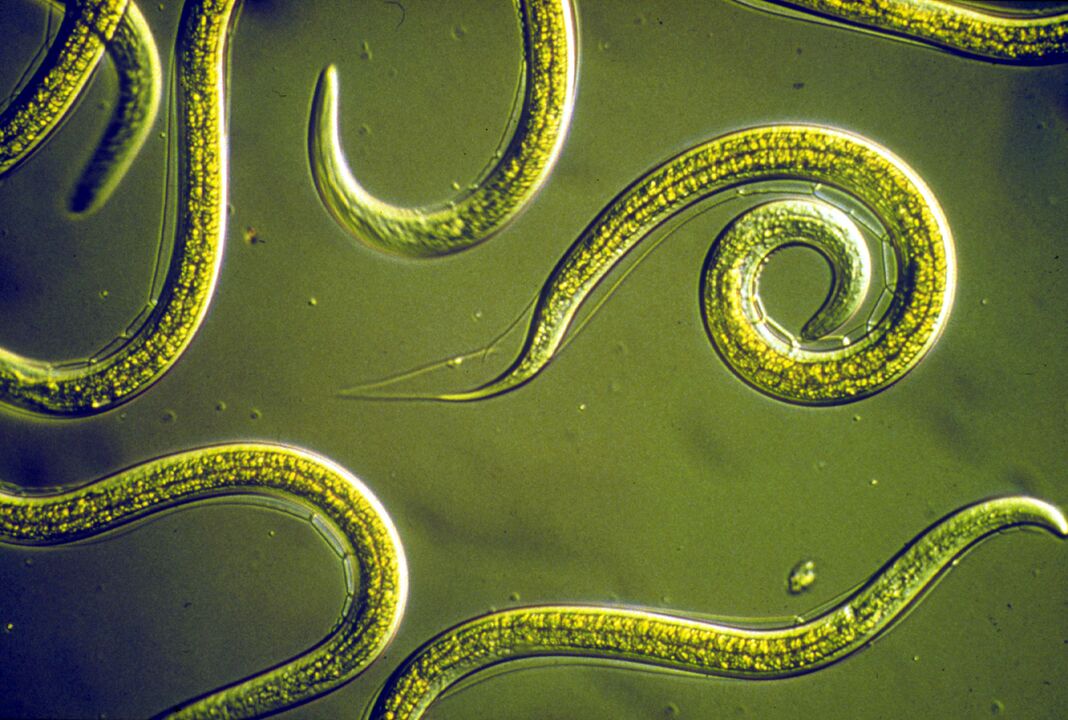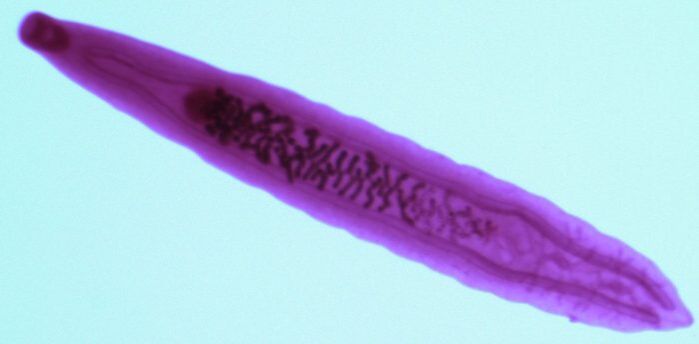Anyone can experience a worm infestation. Toddlers - attend kindergarten, adults - for other reasons. Despite all the preventive measures, you need to know the signs of worms in humans in order to spot the disease in time and start treating it. What are worms, where do they settle and how do they manifest - we will consider in more detail.
What organs can worms infect?

There are two types of invasions: abdominal and tissue. Depending on the species, habitats are also divided:
- Cavitary worms settle in the small and large intestine. In particular, the first parts of the small intestine are affected by broad bands, hookworms, roundworms. The lower part of the small intestine is the habitat of the dwarf tapeworm, pinworm. The colon most often becomes the habitat of the whip.
- Tissue helminths affect organs of any kind: liver, brain, lymph nodes, bile ducts.
Bitan! It is impossible to determine the signs of the presence of worms in a patient in the initial phase of the development of the invasion. While the number of worms is small, toxic poisoning by waste products is within normal limits, the body only copes with the invasion. The appearance of characteristic or acute symptoms indicates a significant increase in the number of helminthic invasions: maturation of individuals and their dynamic development.
Types of chains

By identifying signs of worms in adults, you should understand what type of invasion we are talking about:
- Hairheads. The chains are named after the filamentous body with a thickening at the posterior end. The life cycle of the parasite is direct. Habitat - tropical, subtropical. The chains are localized in the caecum, so they are difficult to erode.
- Nematodes. A suborder of roundworms that live in nature and the human body. The most famous representatives: roundworms, pinworms.
- Fluke. Flat types. They pose a huge threat to the body of the wearer, because they are able to settle in any organ, system. Representatives: schistosomiasis, opisthorchiasis worms.
- Pork tape (ribbon). Tapeworms are hermaphrodites. Having strong hooks on the head to attach to the walls can affect the brain, intestines, liver, eyes, muscles. Consequences of non-treatment: paralysis, death of the carrier.
All types of worms are found in the human body. After getting sick from ascariasis, enterobiasis, diphyllobothriasis, the patient feels a lack of nutrients, the intestines stop absorbing food residues normally. Consequences of invasion: metabolic disorders, neurohumoral reaction.
A few facts about the ways of infection:
- Ascariasis - unwashed vegetables, fruits, hands;
- Raw or lightly salted fish, caviar - difilobotriosis;
- Pinworms - contact method in the household. The period of development is up to 60 days, after which there is a chronic phase of invasion, characterized by reduced immunity and a high incidence of infectious diseases, exacerbation of chronic processes.
Signs of worms in humans
The general symptoms of worms in adults depend on the location of the helminth. The main danger is posed by parasites that settle in vital organs. Worms have appeared, the symptoms are implicit: weakness, cough. And although an examination is necessary for a complete diagnosis. However, there are a number of signs by which you can determine: where the worms are and whether they exist at all.
The brain

There are usually no obvious symptoms, but if the worms live in the human brain, the patient may experience:
- persistent bouts of nausea;
- frequent vomiting;
- severe weakness;
- lethargy of consciousness;
- decreased visual acuity, hearing;
- body temperature fluctuations for no apparent reason;
- epilepsy.
Fact! Most often, parasites are found in the brain only after an autopsy.
In the body

Hundreds of known types of parasites can settle in a patient's body. It is difficult to determine the presence of worms in the body of an adult. Symptoms vary depending on the area of localization: in the heart, liver, lungs, under the skin. Common signs of worms in an adult:
- pain in muscles, joints;
- deterioration of the skin;
- weight jumps: reduction or setting;
- severe constant fatigue;
- immediate decrease in immunity.
Fact! Some worms have the ability to crawl from the anus to the perineum, penetrate the bloodstream to other organs, appear in the abdominal cavity and affect the nose and ears.
In the intestines

The most common worms in humans, whose symptoms are more pronounced, can be in the large and small intestines. Infection occurs through the mouth, by contact. The period of development of the larva and the adult from the egg takes place in the intestinal mucosa. The parasite takes nutrients for itself, blocking their absorption in the intestines. Therefore, there are intestinal problems that cause helminths in adults. Symptoms:
- the abdomen is often swollen;
- the chair is broken;
- bloating occurs;
- changes in body weight;
- they constantly and strongly want to eat.
Of course, in worms the symptoms can be different, overgrown with characteristic signs of gastric diseases, if the patient has them. That is why proper diagnostic measures are so important. Only an expert will determine exactly: where the worm is, the type and dynamics of the development of the invasion.
Signs of helminthiasis depending on the type of parasite
Symptoms of worms in adults may differ from those in childhood. Strong immunity repels invasion, but the child does not have such a trait. Knowing the signs of the presence of worms in a person, it is easier to understand the cause of the disease and at the first suspicion of infection, consult a doctor. Infectious disease specialist, parasitologist, helminthologist - a specialist of the required profile will quickly understand where worms live in the human body and how to get rid of them.
Each parasite causes its own symptoms:
- from tapeworms intestinal problems occur: loss of appetite, sleep disturbance, bloating;
- from round - cough, bloating, flatulence, loss of appetite.
Bitan! Roundworms or roundworms grow up to 40 cm in length and can easily move along the intestinal walls, living in the lungs and liver. This is a very dangerous invasion that needs to be addressed.
Whether tapeworms or roundworms have settled in the human body, they need to be removed. Even in a minimal amount, the invasion can cause serious damage to the organism, and in a large mass of parasites poison the host and often lead to the death of the patient. Knowing where worms live, don’t rush to write off frequent bloating due to a common indigestion, it may be a sign of helminthiasis, which means it’s time to see a doctor.






































